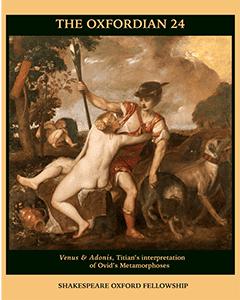By Gary Goldstein, editor of The Oxfordian
 The 24th volume of the Fellowship’s annual peer-reviewed journal – The Oxfordian – is now available to members and other Shakespeare scholars in both print and electronic formats. The online version is available to members as part of SOF membership, while non-members will be able to access three items online: the editor’s column, a research paper, and a book review. The print version is 302 pages long and available for purchase on Amazon.com at $14.99 a copy.
The 24th volume of the Fellowship’s annual peer-reviewed journal – The Oxfordian – is now available to members and other Shakespeare scholars in both print and electronic formats. The online version is available to members as part of SOF membership, while non-members will be able to access three items online: the editor’s column, a research paper, and a book review. The print version is 302 pages long and available for purchase on Amazon.com at $14.99 a copy.
The current volume – the second biggest – offers readers 13 research papers, essays, and notes, along with 6 book reviews, the greatest number ever published in the journal.
“Given the approaching 400th anniversary of The First Folio in 2023,” said editor Gary Goldstein, “I am pleased that we can present two superlative papers on that historic achievement. The first, by Katherine Chiljan, is a detailed examination as to how the prefatory materials of the First Folio prove that its backers deliberately designed its production to deceive readers regarding the authorship of Shakespeare’s works.
“The second paper by James Warren takes a different view. He proposes that the First Folio was designed by the brother Earls to enable Edward de Vere to be easily revealed as William Shakespeare at a future date – when a different political environment would facilitate its acceptance.”
Other papers build upon existing evidence that prove de Vere’s authorship of the canon. Two short articles by Matt Hutchinson show how topical references further the Oxfordian hypothesis. In the first, the author demonstrates that the contemporary reference to “a companion for a King” in John Davies’ epigram, “To Our English Terence, Mr. Will Shake-speare,” shows that Davies considered Shakespeare to be an Earl. The second presents several topical allusions from the 1590s, including one by Ben Jonson, that show a character being compared to a crow — as well as to several poems by Edward de Vere.
In a different vein, author Sky Gilbert gives a superb analysis of Ancient Greek and Renaissance philosophy in the works of Shakespeare, Gorgias and Jerome Cardano, as he seeks to determine the identity of the book that Hamlet is seen reading on stage. Is it Cardano’s On Comfort, or Giorgias’ On Nature?
In a brilliant comparison of de Vere’s biography with a Shakespeare tragedy, the late Warren Hope analyzes the hero of Timon of Athens and the career and life of Edward de Vere, showing how similar they are in terms of interests, psychology and public behavior.
Roger Stritmatter examines a rare Jacobean reference to Shakespeare by poet Michael Drayton. In his paper, he explores the application of Jacobean aesthetic doctrines associated with the idea of “triumphal forms” to Michael Drayton’s encomium to Shakespeare in his 202-line poem, originally printed in Drayton’s 1627 The Battle of Agincourt.
A well-researched monograph by Michael Dudley delves into how we know what we know about the Shakespeare authorship question — and to what extent the modern scholarly community is ethical in how it pursues an answer to that question.
In a pathbreaking paper, Paul Chambers proposes that the disciplines of Machine Learning and Bayesian mathematics can be successfully employed to demonstrate the probability that Edward de Vere was the true author of the Shakespeare canon – and proceeds to do so in this article.
A paper by Heidi Jannsch investigates to what extent the paratexts of Ben Jonson’s play, Sejanus, praises Edward de Vere after his demise in 1604, when his reputation was being censored by the state. Another paper, by Stephanie Hughes, examines the knowledge revealed in Shakespeare’s Sonnets, often seen as private letters written in verse, for what it can tell readers about the author and his social circle of friends and lovers.
A final pair of research papers looks at what is true and what is occult in the Shakespeare canon. Richard Waugman explores the principle of Shakespeare’s “truth” as he employs it in the plays, then examines how Shakespeare uses it in the play of All’s Well That Ends Well. In a different vein, Richard Malim traces de Vere’s interest in the occult as it appears in Giordano Bruno’s works, in Dr. John Dee’s work – a proponent of both the scientific method and occult practices – and how both appear in the Shakespeare plays.
The book reviews in this volume examine two Oxfordian critical editions of Twelfth Night and of The Famous Victories of Henry the Fifth – as well as a collection of papers by Bronson Feldman that investigates the authorship issue in tandem with works of other Elizabethan writers, from Christopher Marlowe to Thomas Watson. The concluding three reviews explore Stephanie Hughes’ new book on Shakespeare’s education, another by Richard Malim that treats Shakespeare as a literary revolutionary, and a 3,000 page electronic opus by Robert Prechter Jr. that seeks to determine whether de Vere wrote under other pseudonyms and allonyms.


